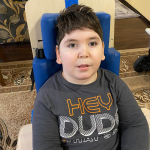Antibacterial therapy: are taking antibiotics effective?
The body of a child with autism spectrum disorder is forced to constantly fight with toxic substances. The fact is that such children have dysfunction of their metabolic processes, and that’s why various toxins accumulate in the body. Natural metabolism of a healthy person eliminates these toxins, but they enter the bloodstream and brain of an autistic patient, promoting the activity of fungi, viruses and bacteria. Therefore, in many cases, doctors recommend not only diet and vitamins, but also stimulating the immune system and treating autism with antibiotics if pathogenic organisms are identified.
When is antibiotic therapy prescribed for autism?
Medicines cannot be prescribed without reason; doctors must rely on the results of clinical studies. A child must take a urine test to help determine whether there are organic acids in it. If acceptable acid levels is exceeded, the body may contain harmful anaerobic bacteria, which can be eliminated with special preparations.
There are also symptoms that may indicate that microflora in a child’s body is impaired. These include, among others:
- Aggression
- Sleep disturbance
- Acetone odour
- Poor appetite
- Intestinal dysfunction
Only medical history and the results of laboratory diagnostic tests can be the basis of optimal antibacterial drug selection and dosage.
Popular medications for antibacterial therapy for autism include:
- Biocin
- Gentamicin
- Flagyl
- Vancomycin
- Immunoglobulin, etc.
All these drugs are intended to normalise the microflora of the gastrointestinal tract and eliminate pathogenic microorganisms.
Advantages and disadvantages of antibacterial therapy for autistic children
Advantages:
- Cleansing the intestines and entire body of harmful bacteria
- Promoting intestinal regeneration.
Disadvantages:
- Short-term effect: scientific observations demonstrated that the initial state of patients’ health returns 2-3 months after stopping treatment.
- Prolonged use of medications increases resistance to them.
Research says that antibacterial therapy is permanent in most cases, but drugs can sometimes cause more harm to the body than autism. Therefore, this is prescribed only in emergency situations, and more gentle and effective procedures should be used first to achieve a better therapeutic effect.
Mardaleishvili Medical Centre in Tbilisi offers patients from different European countries to undergo cell transplantation procedures which are several times more effective than antibacterial drugs.
Correction of childhood autism with stem cells is a relatively new method, but it has already been tested over a ten-year period of active use. Evidence-based medical practice has many successful implementation protocols which is why European doctors confidently recommend it. Treatment of childhood autism with this program is an opportunity to maximally restore the cellular structure of the brain and stop the pathogenesis of the disease.
Get treatment for your child’s autism spectrum disorder to give them the opportunity to develop as healthy children.
Autism Treatment Center Videos
Autism treatment with own stem cells
Cord blood association congress
International Quality Crown
Autism Treatment Reviews
Autism treatment with own stem cells
The story of Alessandro (6 years old)
Autism Patient Testimonial - Stem Cell Treatment
Clients Testimonials

Feedback from Igor, David’s father (12 years old) Read More

Feedback from Olga, Fedya’s mother Read More

Feedback from Natalia, Radomir’s mother (15 years old) Read More

Feedback from Esther, Samuel’s mother (8 years old) Read More

Feedback from Abibe, Selim’s mother (7 years old) Read More












